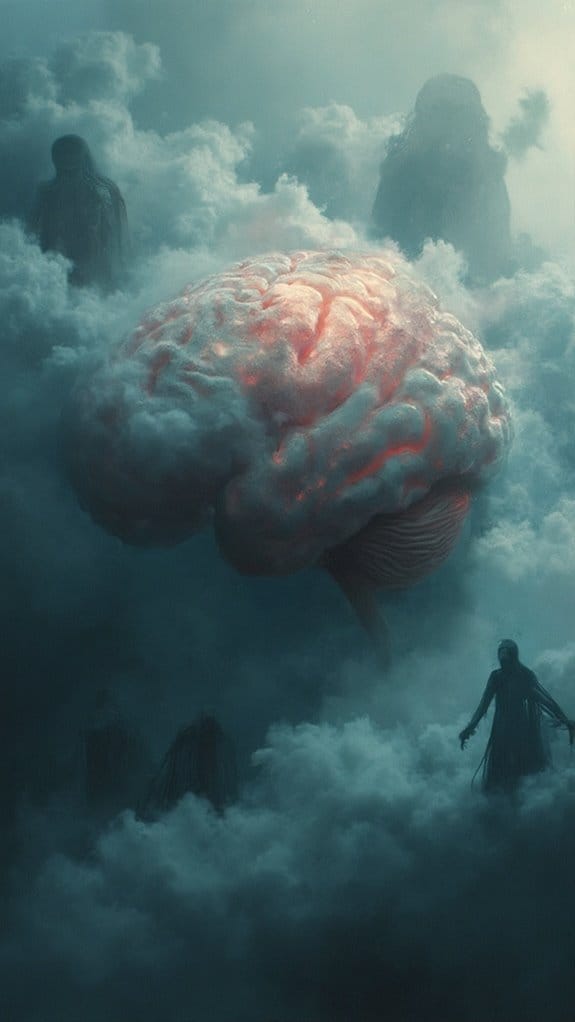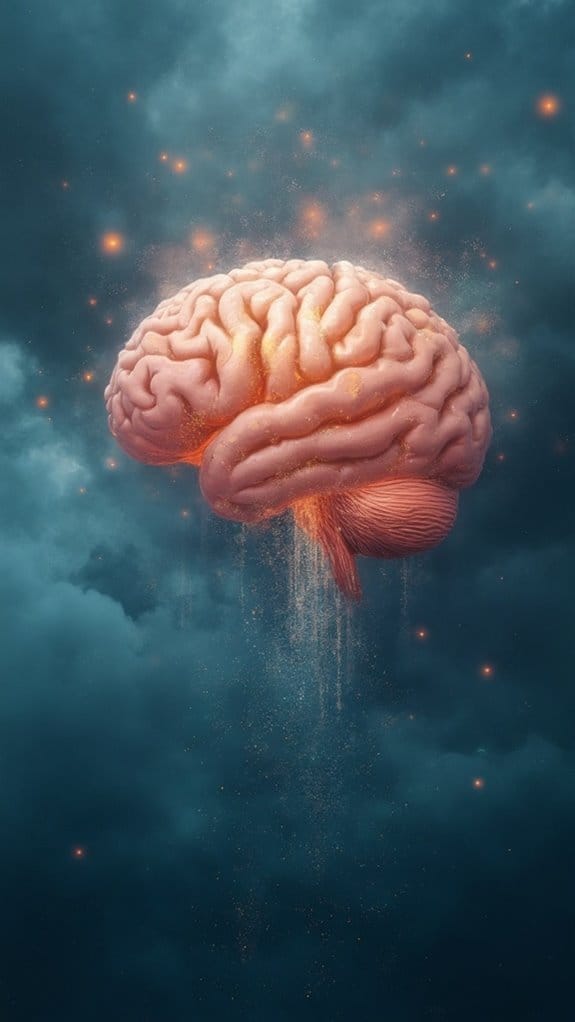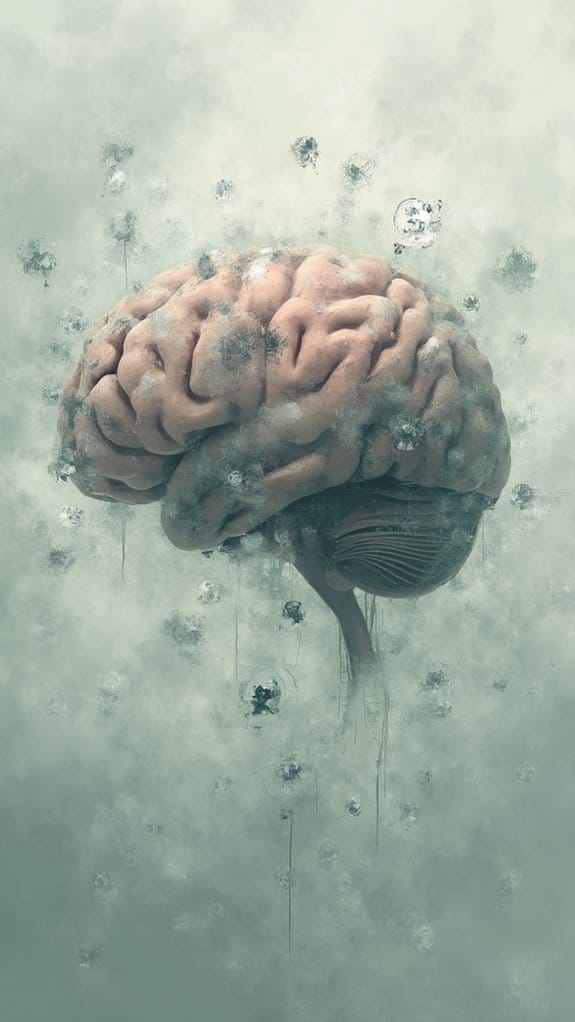The Hidden Link Between Parasites And Brain Fog
Ever wonder why you're struggling to focus or feeling mentally exhausted? The hidden link between parasites and brain fog might surprise you! These tiny organisms can invade your body, disrupt neurotransmitter levels, and leave you grappling with a sluggish mind. Not only do they affect your gut, but they can also impact your brain health, leading to confusion and fatigue. Curious about how to cleanse and regain mental clarity? There's more to explore on this fascinating connection!
Key Takeaways
- Parasites disrupt neurotransmitter levels, leading to cognitive decline and symptoms like brain fog.
- Inflammation from parasite infections can impede brain signaling, further contributing to mental clarity issues.
- Intestinal parasites can cause nutrient deficiencies, exacerbating fatigue and cognitive challenges.
- The immune response to parasites can result in mental exhaustion and mood swings.
- Addressing infections and inflammation through natural remedies can help restore cognitive function.
Understanding Brain Fog: Symptoms and Causes

Have you ever felt like your brain's moving through molasses? You’re not alone. That heavy, sluggish feeling is often called brain fog and can be a real buzzkill.
You might struggle to focus, find it hard to remember things, or feel mentally exhausted. It's like trying to run a marathon in quicksand—frustrating, right? Understanding brain fog starts with recognizing its symptoms. You may notice that your thoughts seem jumbled or you have trouble concentrating on tasks that once felt easy.
Recognizing the symptoms of brain fog is key—jumbled thoughts and concentration struggles can really hold you back.
Causes vary widely and can include: stress, lack of sleep, poor diet, or dehydration. Now, think about what you can do to boost your cognitive clarity. Simple changes in your routine, like getting enough rest or staying hydrated, can help clear that mental haze.
What Are Parasites? An Overview

So, what exactly are parasites? These tiny organisms come in various forms, from microscopic protozoa to larger worms, and they all have one thing in common: they rely on a host to survive. Understanding their life cycles can help you grasp how they affect not just the body, but your mind—yes, even your brain fog!
Types of Parasites
Parasites, those sneaky little organisms, can be more than just a nuisance; they can also impact your health in surprising ways. You might be surprised to learn that there are different types of parasites, each with unique behaviors and effects on your body.
Intestinal parasites, for example, hitch a ride in your digestive system, causing discomfort and nutrient deficiencies. On the other hand, brain parasites can infiltrate your neurological system, leading to symptoms like brain fog and confusion. Have you ever felt sluggish and unfocused? It might be time to reflect on these hidden invaders.
By understanding these parasites, you'll be empowered to take control of your health and reclaim your clarity. Who wouldn't want that?
Life Cycle Overview
While you might think of parasites as mere nuisances, their life cycles are fascinating and complex, revealing how cunning these organisms can be. These tiny invaders rely on host interactions to thrive, and their life cycles often involve multiple stages. From eggs to larvae to adult forms, each stage is designed to exploit hosts effectively.
Have you ever wondered how a single parasite can manipulate its host's behavior? This clever strategy guarantees its survival and reproduction. As you explore the world of parasites, you'll see how they cleverly adapt to their environments, making them both intriguing and a little unnerving.
Understanding their life cycles can help you appreciate the balance of nature and the delicate dance of life.
The Connection Between Parasites and Cognitive Function

Have you ever felt like your brain is in a fog, and you can't quite shake it off? Believe it or not, parasites might be messing with your neurotransmitters and immune response, which can lead to those frustrating cognitive lapses. Let's explore how these tiny invaders can stir up inflammation and impact your thinking, because understanding this connection might just clear the air for you!
Parasites Affect Neurotransmitter Levels
When you think about what might be zapping your focus, parasites probably don’t come to mind, right? But these sneaky invaders can wreak havoc on your brain by disrupting neurotransmitter levels. Neurotransmitters are the chemical messengers that keep your cognitive function sharp, and an imbalance can lead to cognitive decline.
Imagine feeling foggy, unmotivated, or unable to concentrate—all thanks to these tiny creatures! They can interfere with the production and regulation of essential neurotransmitters like serotonin and dopamine, which play key roles in mood and focus.
Immune Response and Cognition
You mightn't realize it, but your immune system plays a significant role in how your brain functions, especially when it comes to dealing with pesky parasites.
When parasites invade your body, your immune response kicks in, but this battle can come at a cost. As your body fights off these unwelcome guests, it can lead to cognitive decline. You might find yourself battling brain fog, struggling to think clearly, or feeling mentally sluggish.
It’s fascinating how these little invaders can affect your mental clarity. So, next time you’re feeling unfocused, consider the connection between your immune system and cognition. Strengthening your immune system can help you reclaim your mental sharpness and enjoy the freedom of clear thinking.
Inflammation’s Role in Thinking
Though it might seem surprising, inflammation plays an essential role in how you think, especially when your body is dealing with pesky parasites. When parasites invade, your body mounts an inflammatory response, which can lead to cognitive decline. You might feel foggy, forgetful, or just not quite yourself.
Ever wondered why your sharpness fades when you’re battling these unwelcome guests? It’s because inflammation can disrupt signaling in your brain, making it harder to focus or recall information. So, if you’re seeking mental freedom, it’s vital to address any underlying infections. By tackling these parasites and reducing inflammation, you can reclaim your mental clarity and feel more vibrant.
After all, a clear mind is essential for living life to its fullest!
Common Types of Parasites Affecting Mental Clarity
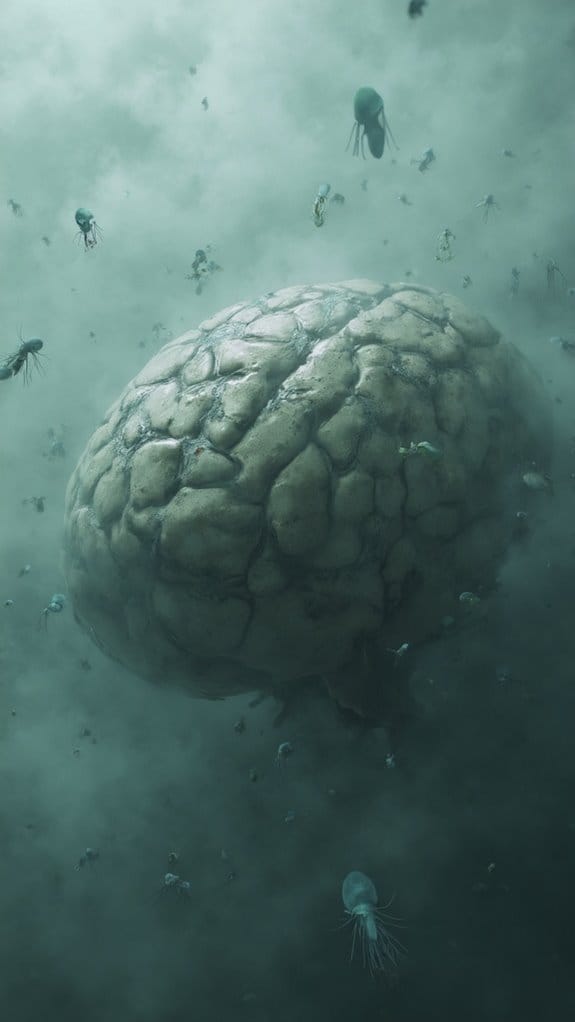
Have you ever felt like your brain's stuck in a fog? You’re not alone. Many experience this cloudiness, often without realizing that common parasites might be to blame. Parasite prevalence is surprisingly high, with many people hosting these unwelcome guests without even knowing it.
Take Giardia, for instance. This little bug can lead to brain fog and cognitive decline, making it hard to focus on even the simplest tasks. Then there's Toxoplasma, often linked to changes in behavior and mood. It’s fascinating—and a bit alarming—how these organisms can affect our mental clarity.
You might wonder how these parasites slip into our lives. Contaminated food, water, and even pets can be culprits. Recognizing the signs is essential; after all, who doesn’t want to break free from that mental haze? A clearer mind could be just a step away!
How Parasites Impact Brain Health

When you think about brain health, parasites probably aren’t the first thing that comes to mind, right? Yet, these tiny invaders can greatly impact your cognitive function. Their behavior can lead to inflammation and nutrient depletion, both of which contribute to cognitive decline.
You might wonder how something so small could wield such power over your mind. Picture this: when parasites take up residence in your body, they can disrupt the balance of your gut microbiome. This disruption might affect your mood and focus, leaving you feeling foggy and unfocused.
It's like trying to drive a car with a flat tire; you can’t reach your destination smoothly.
Symptoms of Parasite Infection Beyond the Gut

While you might think of parasites primarily as belly invaders, their impact can extend far beyond your gut. You may experience unusual symptoms that leave you feeling out of sorts, even if your stomach seems fine. Mental fatigue is a common complaint, making it hard to focus or feel energized.
Here's a quick look at some of these symptoms:
| Symptom | Description |
|---|---|
| Unusual Fatigue | A constant, draining tiredness |
| Mood Swings | Sudden shifts in emotional state |
| Skin Irritations | Rashes or unexplained itchiness |
| Sleep Disturbances | Trouble falling or staying asleep |
| Brain Fog | Difficulty concentrating or thinking |
If you’re noticing any of these signs, it might be time to dig deeper. Your freedom and well-being matter, so don’t let parasites keep you in the dark!
Diagnosing Parasite Infections: What to Look For
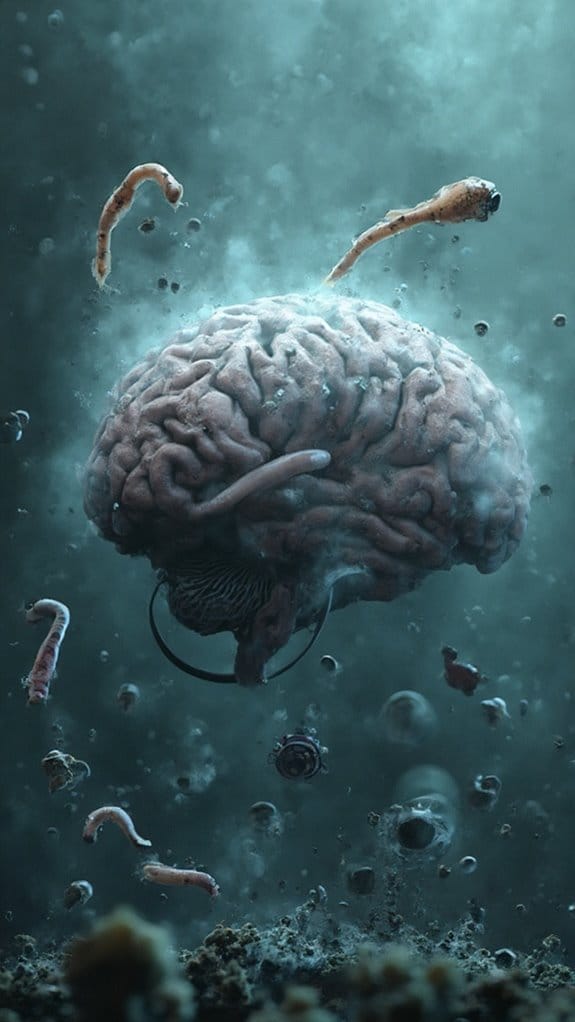
How can you tell if those pesky parasites are behind your symptoms? First, pay attention to your body. If you’re feeling unusually fatigued, experiencing digestive issues, or even struggling with brain fog, it might be time to reflect on parasite testing.
Diagnostic methods can vary, but they often include stool tests, blood tests, and even imaging studies. These tests help identify the type of parasite and the degree of infection.
Diagnostic methods for parasites include stool tests, blood tests, and imaging studies to identify the infection type and severity.
Don't ignore the signs! You might notice unexpected weight changes, skin irritations, or even mood swings—these can all be linked to parasites. It's essential to consult a healthcare professional who understands your concerns. They’ll guide you through the diagnostic process and help determine the best course of action.
Natural Remedies and Treatments for Parasite Cleansing

If you suspect that parasites might be causing your discomfort, you might be keen to explore natural remedies and treatments for parasite cleansing. Embracing herbal remedies can be a powerful first step. Think about incorporating garlic, wormwood, or black walnut into your diet. These herbs have been used for ages to support your body in fighting off unwanted guests.
Additionally, detox protocols can help you regain your clarity and energy. Consider a gentle cleanse, focusing on wholesome foods, plenty of water, and maybe even some probiotics to restore balance in your gut. Have you thought about the importance of fiber? It’s essential for flushing out toxins.
Tips for Maintaining Cognitive Health and Preventing Infection
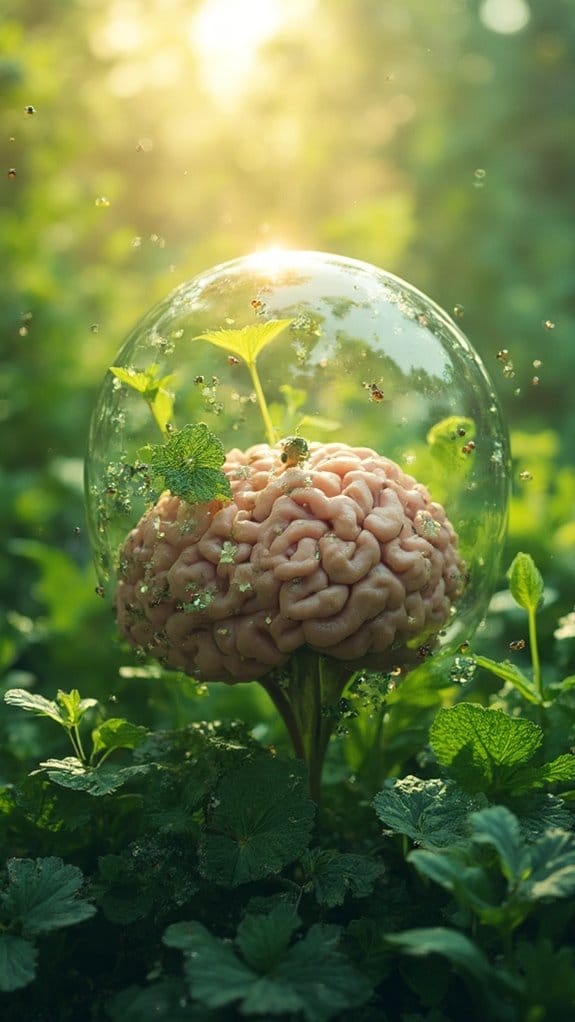
To keep your mind sharp and ward off pesky infections, it’s essential to adopt some healthy habits that support both your cognitive health and immune system. Why not start with some fun cognitive exercises? Puzzles, memory games, or even learning a new skill can keep your brain engaged and thriving.
Next, let’s talk about dietary choices. You know the saying: “You are what you eat.” Fill your plate with colorful fruits and veggies, whole grains, and healthy fats. Foods rich in omega-3s, like salmon and walnuts, can boost brain function, while antioxidants help fend off infections.
Don’t forget to stay hydrated! Water is crucial for both your brain and body. And remember, a good night’s sleep works wonders for cognitive performance and immune strength. So, are you ready to embrace these habits? Your mind and body will thank you!
Frequently Asked Questions
Can Parasites Affect Mood and Emotional Well-Being?
Parasites can impact your mood and emotional health. You might not realize it, but parasite symptoms—like fatigue and irritability—can mess with how you feel.
Ever felt off for no reason? It could be linked to these unwelcome guests! They can influence your brain chemistry, leading to anxiety or depression.
How Do I Know if I Have a Parasite?
You might wonder if you’ve got a parasite, right? Start with a symptom checklist: look for unusual fatigue, digestive issues, or unexplained weight changes. If these sound familiar, it’s time to contemplate diagnostic tests.
Your doctor can run stool tests or blood work to confirm. Don’t ignore those signs! After all, who wants unwanted guests hanging around? Taking charge of your health is the first step toward feeling your best!
Are There Specific Diets to Help Fight Parasites?
There are specific diets that can help fight parasites! You’ll want to focus on anti-parasitic foods like garlic, pumpkin seeds, and turmeric. These powerhouses not only taste great but also boost your gut health, creating an environment that parasites struggle to thrive in.
Ever thought about how your diet affects your well-being? Embracing these foods might just be the freedom you’re looking for.
Can Pets Transmit Parasites to Humans?
Oh, you thought your furry friend was just a bundle of joy? Well, pets can actually transmit parasites to humans! It's true—through pet transmission, you could end up with some unwelcome guests. Symptoms like fatigue, digestive issues, or that pesky brain fog might just be their way of saying "surprise!"
Is Brain Fog Reversible After Treating a Parasite Infection?
Yes, brain fog can be reversible after treating a parasite infection! Once you tackle the underlying issue with effective parasite treatment, many folks notice significant improvements in mental clarity and focus.
You might find that your brain recovery accelerates with proper nutrition and rest. Isn't it fascinating how your body can bounce back? Just remember, healing varies, so give yourself time.
You deserve to feel sharp and vibrant again!
Conclusion
So, there you have it! Just like a computer can slow down with too many tabs open, your brain can feel foggy if parasites invade your system. By staying aware of the symptoms and taking proactive steps, you can protect your mental clarity and overall health. After all, a clear mind is a powerful tool. So, why not embrace a healthier lifestyle and keep those pesky parasites at bay? Your brain will thank you!




